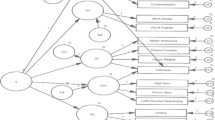Abstract
Intelligence testing is used for many purposes including identification of children for proper educational placement (e.g., children with learning disabilities, or intellectually gifted students), and to guide education by identifying cognitive strengths and weaknesses so that teachers can adapt their instructional style to students’ specific learning styles. Most of the research involving intelligence tests has been conducted in highly developed Western countries Yet the need for intelligence testing is as or even more important in developing countries. The present study, conducted through the Vietnam National University Clinical Psychology CRISP Center, focused on the cultural adaptation of the WISC-IV intelligence test for Vietnam. We report on (a) the adaptation process including the translation, cultural analysis and modifications involved in adaptation, (b) present results of two pilot studies, and (c) describe collection of the standardization sample and results of analyses with the standardization sample, with the goal of sharing our experience with other researchers who may be involved in or interested in adapting or developing IQ tests for non-Western, non-English speaking cultures.
Similar content being viewed by others
References
Binet, A., & Simon, M. D. (1916). The development of intelligence in children (the Binet-Simon scale). Baltimore: Williams & Wilkins Company.
Carr, S. C., & Schumaker, J. F. (1996). Psychology and the developing world. Westport: Praeger.
Carroll, J.B. (1997). What abilities are measured by the WISC-III? In B. Bracken & R.S McCallum (Eds), Wechsler Intelligence Scale for Children-Third Edition (pp. 134–143). Knoxville, TN: Journal of Psychoeducational Assessment Monograph Series.
Central Intelligence Agency. (2009). World fact book—Vietnam. Washington: Central Intelligence Agency.
Chen, H., Keith, T. Z., Weiss, L., Zhu, J., & Li, Y. Q. (2010). Testing for multigroup invariance of second-order WISC-IV structure across China, Hong Kong, Macau, and Taiwan. Personality and Individual Differences, 49(7), 677–682.
Dang, H. M., Weiss, B., Pollack, A., & Nguyen, M. C. (2011). WISC-IV Vietnam technical and interpretative manual. Hanoi: Vietnam National University Educational Publishing House.
Dang, L. B., & Tran, T. Q. (2010). The role of government, school and family in education in Vietnam, in the context of market mechanisms and international integration. Journal of the Science of Education, 9(1), 1–7.
General Statistics Office of Vietnam. (2010). Statistical handbook 2010. Hanoi: GSO.
Georgas, J., Weiss, L. G., van de Vijver, F. R. J., & Saklofske, D. H. (2003). Culture and children’s intelligence: cross-cultural analysis of the WISC-III. New York City: Academic.
Grégoire, J. (2001). Factor structure of the French adaptation of the WISC-III: three or four factors. International Journal of Testing, 1(3), 271–281.
Hale, J. B., Hoeppner, J. B., & Fiorello, C. A. (2002). Analyzing Digit Span components to assessment of attention processes. Journal of Psychoeducational Assessment, 20(2), 128–143.
Holsinger, D. B. (2009). The distribution of education in Vietnam: does equality matter. In Y. Hirosato & Y. Kitamura (Eds.), The political economy of educational reforms and capacity development in Southeast Asia: Cases of Cambodia, Laos and Vietnam (pp. 191–216). New York City: Springer.
Kaufman, A. S. (1994). Intelligent testing with the WISC-III. Oxford: Wiley.
Meyer, G. J., Finn, S. E., Eyde, L. D., Kay, G. G., Moreland, K. L., Dies, R. R., et al. (2001). Psychological testing and psychological assessment: a review of evidence and issues. American Psychologist, 56(2), 128–165.
Nguyen, N. N. (2004). Trends in the education sector. In P. Glewwe, N. Agrawal, & D. Dollar (Eds.), Economic growth, poverty and household welfare in Vietnam (pp. 425–465). Washington: The World Bank.
Rindermann, H. (2008). Relevance of education and intelligence at the national level for the economic welfare of people. Intelligence, 36(2), 127–142.
Saklofske, D. H., Weiss, L. G., Beal, A. L., & Coalson, D. (2003). Culture and children's intelligence: cross-cultural analysis of the WISC-III. In G. James, L. G. Weiss, F. J. R. van de Vijver, D. H. Saklofske, & D. H. Saklofske (Eds.), The Wechsler Scales for assessing children's intelligence: past to present (pp. 3–21). San Diego: Academic.
Suen, H. K., & French, J. L. (2003). A history of the development of psychological and educational testing. In C. R. Reynolds & R. W. Kamphaus (Eds.), Handbook of psychological and educational assessment of children: Intelligence, aptitude, and achievement (2nd ed., pp. 3–23). New York City: Guilford Press.
Tran, N.T. (2009). Issues related to the adaptation and use of the WISC test in Vietnam. Conference on Needs, Directions, and Training in School Psychology in Vietnam. August 3 & 4, 2009, Hanoi, Vietnam.
Tuan, T., & Harpham, T. (2005). Primary education in Vietnam: extra classes and outcomes. International Education Journal, 6(4), 626–634.
Wechsler, D., Kaplan, E., Fein, D., Kramer, J., Morris, R., Delis, D., et al. (2004). WISC-IV technical and interpretative manual. San Antonio: NCS Pearson.
Woody-Dorning, J., & Miller, P. H. (2001). Children’s individual differences in capacity: effects on strategy production and utilization. British Journal of Developmental Psychology, 19(4), 543–557.
World Bank. (2010). Gross national income per capita 2009. Washington: Author.
Author information
Authors and Affiliations
Corresponding author
Additional information
This research was supported by the U.S. National Institutes of Health Fogarty International Center, in particular grants D43-TW007769, R21-TW008435 and D43-TW005805, and by grant VNU-2009-011 from Vietnam National University.
Rights and permissions
About this article
Cite this article
Dang, HM., Weiss, B., Pollack, A. et al. Adaptation of the Wechsler Intelligence Scale for Children-IV (WISC-IV) for Vietnam. Psychol Stud 56, 387–392 (2011). https://doi.org/10.1007/s12646-011-0099-5
Received:
Accepted:
Published:
Issue Date:
DOI: https://doi.org/10.1007/s12646-011-0099-5




